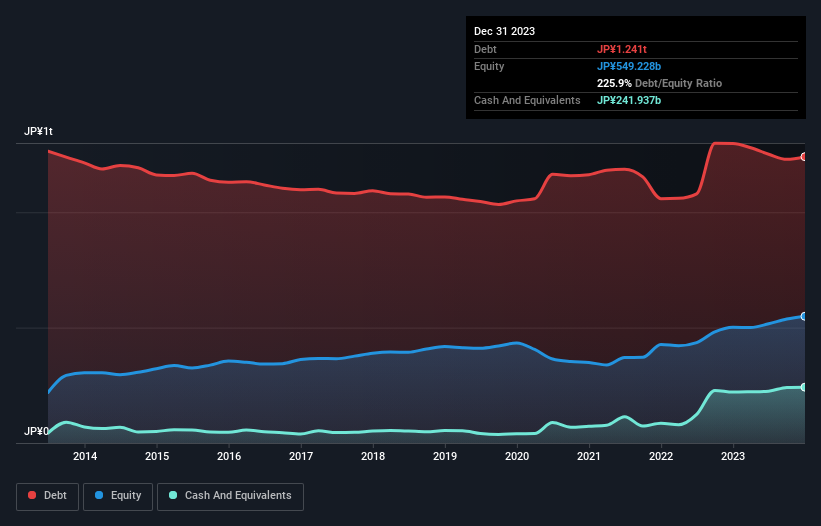Warren Buffett famously said, 'Volatility is far from synonymous with risk.' It's only natural to consider a company's balance sheet when you examine how risky it is, since debt is often involved when a business collapses. We note that Kintetsu Group Holdings Co.,Ltd. (TSE:9041) does have debt on its balance sheet. But should shareholders be worried about its use of debt?
When Is Debt Dangerous?
Generally speaking, debt only becomes a real problem when a company can't easily pay it off, either by raising capital or with its own cash flow. If things get really bad, the lenders can take control of the business. However, a more common (but still painful) scenario is that it has to raise new equity capital at a low price, thus permanently diluting shareholders. By replacing dilution, though, debt can be an extremely good tool for businesses that need capital to invest in growth at high rates of return. When we think about a company's use of debt, we first look at cash and debt together.
View our latest analysis for Kintetsu Group HoldingsLtd
What Is Kintetsu Group HoldingsLtd's Net Debt?
The image below, which you can click on for greater detail, shows that Kintetsu Group HoldingsLtd had debt of JP¥1.24t at the end of December 2023, a reduction from JP¥1.30t over a year. However, it does have JP¥241.9b in cash offsetting this, leading to net debt of about JP¥998.8b.

How Healthy Is Kintetsu Group HoldingsLtd's Balance Sheet?
Zooming in on the latest balance sheet data, we can see that Kintetsu Group HoldingsLtd had liabilities of JP¥676.2b due within 12 months and liabilities of JP¥1.19t due beyond that. Offsetting this, it had JP¥241.9b in cash and JP¥186.3b in receivables that were due within 12 months. So its liabilities total JP¥1.44t more than the combination of its cash and short-term receivables.
This deficit casts a shadow over the JP¥825.4b company, like a colossus towering over mere mortals. So we'd watch its balance sheet closely, without a doubt. At the end of the day, Kintetsu Group HoldingsLtd would probably need a major re-capitalization if its creditors were to demand repayment.
We use two main ratios to inform us about debt levels relative to earnings. The first is net debt divided by earnings before interest, tax, depreciation, and amortization (EBITDA), while the second is how many times its earnings before interest and tax (EBIT) covers its interest expense (or its interest cover, for short). The advantage of this approach is that we take into account both the absolute quantum of debt (with net debt to EBITDA) and the actual interest expenses associated with that debt (with its interest cover ratio).
As it happens Kintetsu Group HoldingsLtd has a fairly concerning net debt to EBITDA ratio of 6.0 but very strong interest coverage of 15.9. This means that unless the company has access to very cheap debt, that interest expense will likely grow in the future. Importantly, Kintetsu Group HoldingsLtd grew its EBIT by 92% over the last twelve months, and that growth will make it easier to handle its debt. There's no doubt that we learn most about debt from the balance sheet. But ultimately the future profitability of the business will decide if Kintetsu Group HoldingsLtd can strengthen its balance sheet over time. So if you're focused on the future you can check out this free report showing analyst profit forecasts.
Finally, a company can only pay off debt with cold hard cash, not accounting profits. So it's worth checking how much of that EBIT is backed by free cash flow. Over the last three years, Kintetsu Group HoldingsLtd actually produced more free cash flow than EBIT. That sort of strong cash conversion gets us as excited as the crowd when the beat drops at a Daft Punk concert.
Our View
We weren't impressed with Kintetsu Group HoldingsLtd's net debt to EBITDA, and its level of total liabilities made us cautious. But like a ballerina ending on a perfect pirouette, it has not trouble covering its interest expense with its EBIT. Looking at all this data makes us feel a little cautious about Kintetsu Group HoldingsLtd's debt levels. While debt does have its upside in higher potential returns, we think shareholders should definitely consider how debt levels might make the stock more risky. When analysing debt levels, the balance sheet is the obvious place to start. But ultimately, every company can contain risks that exist outside of the balance sheet. To that end, you should learn about the 3 warning signs we've spotted with Kintetsu Group HoldingsLtd (including 1 which can't be ignored) .
When all is said and done, sometimes its easier to focus on companies that don't even need debt. Readers can access a list of growth stocks with zero net debt 100% free, right now.
Valuation is complex, but we're here to simplify it.
Discover if Kintetsu Group HoldingsLtd might be undervalued or overvalued with our detailed analysis, featuring fair value estimates, potential risks, dividends, insider trades, and its financial condition.
Access Free AnalysisHave feedback on this article? Concerned about the content? Get in touch with us directly. Alternatively, email editorial-team (at) simplywallst.com.
This article by Simply Wall St is general in nature. We provide commentary based on historical data and analyst forecasts only using an unbiased methodology and our articles are not intended to be financial advice. It does not constitute a recommendation to buy or sell any stock, and does not take account of your objectives, or your financial situation. We aim to bring you long-term focused analysis driven by fundamental data. Note that our analysis may not factor in the latest price-sensitive company announcements or qualitative material. Simply Wall St has no position in any stocks mentioned.
About TSE:9041
Kintetsu Group HoldingsLtd
Engages in the transportation, real estate, logistics, merchandise, hotel, leisure, and other businesses in Japan and internationally.
Fair value with acceptable track record.
Market Insights
Community Narratives



